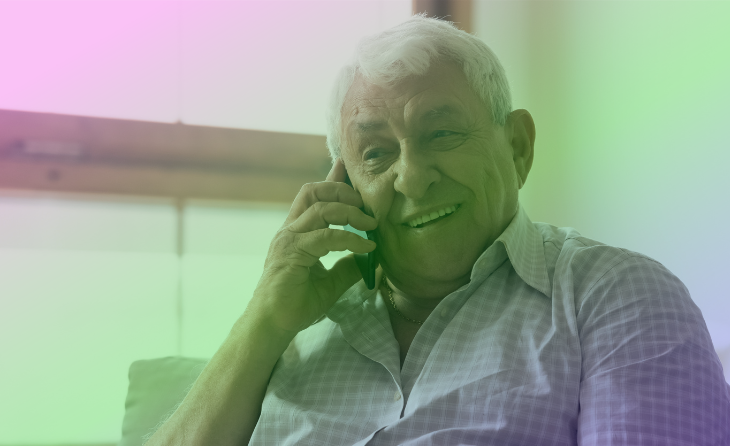
When COVID-19 reached our shores in March 2020, the consequent forced closure of UK businesses came as a shock. For a charity working with 80-90,000 vulnerable people, the shock felt from said closures was palpable.
When your entire operating model relies on the face-to-face contact between service users and counselling and support services, how do you make sure that that support isn’t severed? How do you make sure that those that rely on your services aren’t just left to fend for themselves? And how do you prevent a surge of people battling mental health issues and alcohol and substance abuse from being isolated during a pandemic?
You need to find a different way to engage.
The Business Challenge
As an existing Daisy customer, we began a conversation which looked at whether pay-as-you-go mobile handsets given to service users in place of face-to-face appointments would be a viable option. The problem was that the business’ existing mobile fleet setup – which all ran off the corporate network in order to enable their corporate staff to carry out their core workloads – was not conducive to also facilitating the needs of their service users. Unfortunately, there was a real likelihood that such an option would be open to abuse and that the provision of handsets would, in some cases, likely result in misuse.
This also kickstarted a bigger conversation around where the responsibility of ownership for such a solution would fall; who would be responsible for the topping up of handsets etc.? Where possible, the customer didn’t want the corporate responsibility of determining who got a phone and how that was paid for etc. But, if not them, who else could? The implications of how much time such an undertaking would take was huge. There was billing queries to consider, mobile use to oversee as well as the general admin that comes with managing a large fleet of mobile devices. And so seemingly, the customer faced a dilemma.
The Solution
Luckily, Daisy was already well on their way to making this work. The solution was simple. Each individual project (initiatives run at branch level across the country) would be in charge of deciding who would be provided with a handset, meaning that the cost and billing of each set was dealt with by them also as each project had its own unique cost centre. Thanks to its existing working relationship, Daisy already had this granular data captured. Half the battle was won.
Daisy then convinced the business to let it take on the handling of the undertaking so as to take the onus off their corporate team during a period where every business and every charity in the UK was experiencing significant upheaval in the day-to-day, BAU operations. In addition, given the number of service users (potentially needing to reach 90,000 users) the customer was nervous as to how big the need for mobile devices was going to get and so having Daisy managing the project was the most sensible option.
Then, following a review of all networks, Daisy decided that O2 was the best-fit for their needs. Through O2, Daisy would be able to lock down SIMs enough to prevent handsets being used in the wrong way and ensuring they were used for the sole purpose of keeping in touch with Change Grow Live as they would pre-lockdown.
For the majority of use cases, O2 voice-only SIMs, which would also mitigate the need for data plans, were provided alongside Nokia handsets which would be the easiest to replace if lost or damaged. However, in some exceptional cases, Daisy also provided some users with MiFi devices, laptops, and tablets to facilitate certain users to access the customer’s online services such as counselling sessions, seminars, and focus group meetings.
And what about the handling of each device once each project had determined who should get what?
Well, for an extra 50p per handset, Daisy provided a managed mobile service wrap. This meant that a Daisy service manager would proactively manage each connection. So, if any number needed to be stopped or changed, or anything was needed that would usually require the customer to contact a service desk for, would be handled there and then, and the service manager would just communicate each change with the individual project that corresponding to that device.
The Result
Having Daisy handle this large undertaking meant that the customer was left to deal with the day-to-day running of its business and see it through a period of unprecedented heaving, without the headache of having to handle the administrative strain of mobile connections it didn’t previously have. And good job. What started off as 100 or so connections at the start of the pandemic, grew steadily to the delivery of 7,000 handsets.
These 7,000 handsets saw the customer and its users through the most intense period of the pandemic i.e., lockdowns, Tiering systems etc. and was being done on an ad-hoc, as-needed basis. Since then, this had led to conversations around formalising the process in to a one-year contract which has since led to a renewal for another year. So, what was supposed to be a temporary solution to see the charity through the closure of face-to-face services became a solution that has not only done that, but had also improved engagement, enhanced the services provided previously, and, perhaps most importantly and in the customer’s own words, had “genuinely saved lives.”
This solution is now an invaluable and integral part of how the charity operates, offering service users a choice in terms of a preferred way to communicate. For some, the return to face-to-face contact will always be the chosen route. But for others, having the option to check in via a phone call mitigates any feelings of apprehension about face-to-face counselling which can ultimately reduce the likelihood of missed appointments.
During the business’ annual review of big key achievements, this mobile project with Daisy was one of the key successes mentioned. Increased engagement with its users has made an incredible impact on the organisation as a whole.
